Los Angeles Gladiators’ Brenda Suh On The Future And The Team’s Performance
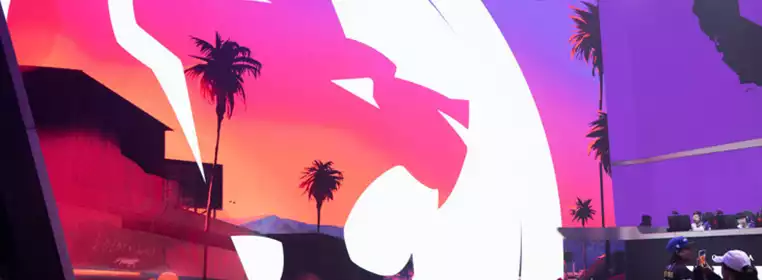
The Los Angeles Gladiators have been a staple in the Overwatch League since its inception in 2018. However, the 2020 season has not been so kind to the Gladiators. After having to refurbish their entire staff structure, the Gladiators are in their rebuild year, and one of the heads of that daunting project is Director of Operations, Brenda Suh.
Focused on a building out a great team culture, and indulging in a bit of mint chocolate chip ice cream in her free time, Brenda spoke candidly with GGRecon about the Los Angeles Gladiators recent performances, the future of the brand both in the Overwatch League and in the Call of Duty League, and how their shockingly lean staff has managed to thrive throughout a global pandemic and two separate esports leagues.
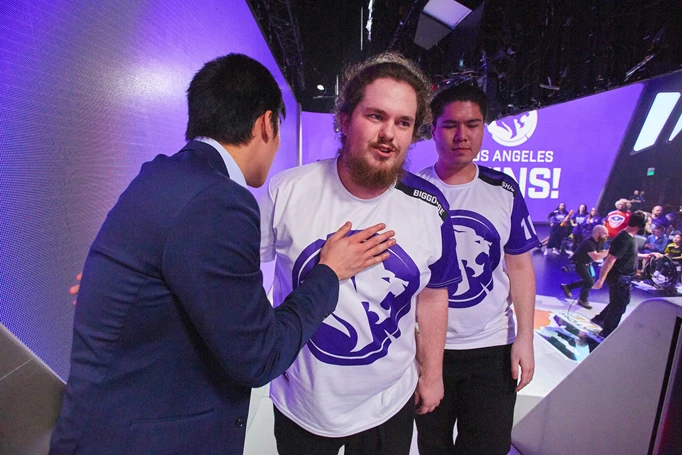
 Click to enlarge
Click to enlargeGoing into 2020, what was the evolution of the brand? What were some of the goals the marketing team had, or what did you hope to impart onto the community from the brand as a whole? What do you want the fans to see or feel when they see that big purple Gladiators’ shield?
It’s not exactly my area of expertise, but I can say that as a team internally, we’ve talked a lot about just maintaining what was done in the last two years. Having such a strong fan base, we wanted to try and maintain that, but we also knew we didn’t have the right people in the staff, we actually just didn’t have people on the staff, right? So, we hired ULT to help us maintain that and keep the brand as we worked on what our longterm vision was, what our style would be, and then bring in the pieces that would really fit that mould.
What is the long term vision for the Gladiators brand?
We want to grow bigger than the Gladiators, right? As far as Gladiators itself and its community, I think everything that was built within these last two years, we want to keep really true to those roots. Then we have to find a way to be able to blend that back into our greater [organisation]. [Kroenke Sports and Entertainment] is not a standout name right now, but as we develop the parent branding, what our actual esports organisation looks like, we want to make sure we aren’t just building that of the Gladiators back but pulling that and combining these two things together, which is where a lot of the planning has been this year.
That reminds us of the Call of Duty League, where you guys participate too. Is that along those same lines where you have these two titles, but want to combine them and possibly venture out into other sectors as well?
We’d like to see both. Between Guerrillas and Gladiators, for Overwatch and Call of Duty, the fan bases are different just in community and style and preferences as well. With that being said, you can treat these as two very separate things, or we can recognise that both of those are city-based franchises. We represent LA, with Hollywood Park and our upper management as well, we have really strong roots in LA. So, [figuring] out a way to marry and blend these two things together is definitely a goal.
Our coaching staff does not live on site. So when we closed the office due to COVID, it meant that we were fracturing and making a clear separation between those two entities.
- Brenda Suh
With that said, what are some of the successful ways you and your team have been able to tie in the Los Angeles representation into both the Guerrillas and Gladiators brands? What areas have you been able to tie in that home and family feel?
I think Joy would definitely be better to speak to on some of this stuff, so I don’t want to do her injustice there, but starting with the Gladiators brand, something that I really enjoyed [about] joining the team this year was that in the past the fans in the community have been very courageous and bold. When you think of Gladiators, you think of banning together, and all the spoken things, all the “shields up” chants makes this strong united front, and that’s something that I think was shown in our playstyle as well. So we want to tap into that.
With Guerrillas branding it is similar, but they’re more that gritty, strong force, that’s sort of scrappy. So we look to think about how to better tie these strengths together and then when you think of LA, as a whole, the diversity and the inclusiveness that comes with it, the same thing goes for Southern California, right? We see those stylistic differences, and we just have to pick a direction and find what those common themes are.
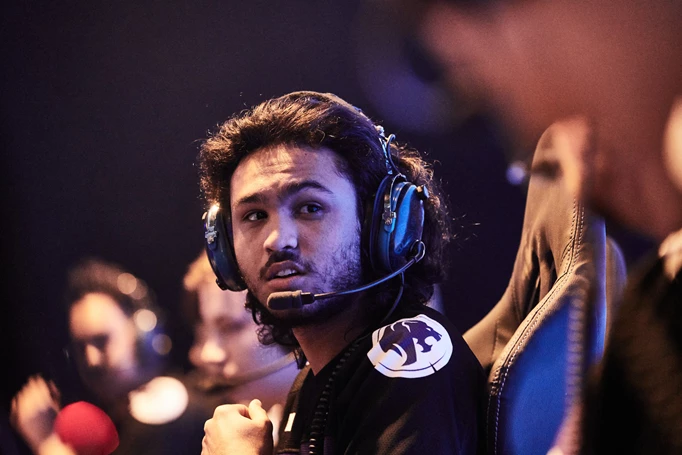
 Click to enlarge
Click to enlargeIt’s always interesting to hear about the thought that goes into all of the colours and imagery that is used for team’s branding, but we can’t ignore what is going on in the world at the moment. So, how has esports for KSE Esports changed post the COVID-19 pandemic?
So, on both sides of the fence, it has been hard, not only for us but for everybody. The biggest thing with COVID is that you can’t plan for it, day by day the news is changing, the concerns are changing. What we predicted was going to happen in a month, might happen, or it might just go in the opposite direction. So, I think that it makes it hard for everyone to adapt to.
For us in particular, for the Gladiators, this was not a team that was built to be remote—both in the nature of the game and in terms of closeness. There is a reason why team houses are dominant in the space, but also just the way we stacked our deck as far as investing into a really strong coaching staff because we wanted to build around that. Also to bring in good players to work around that obviously, but to start there with strong leadership. That’s something that we really value.
With COVID, we always put safety first, and in the moment those have always been the right decisions. We will always prioritise the health and safety of our staff and our players, but at the same time, looking back, we could have been a little bit looser with what we felt was the safest route. So, for example, all of our players are in the team house right now. Our coaching staff does not live on site. So when we closed the office due to COVID, it meant that we were fracturing and making a clear separation between those two entities.
We could have probably allowed the coaches at the team house during matches and stuff like that, but we took things really slow so that everyone was comfortable with the decisions that we were making and so that we were able to look at what other people were doing and see the results of what processes, protocols, and safety measures they took to see if they would be something that could also work for us because [esports] is a little more unique.
We don’t have to worry about, for the most part, our players going out and socialising with their friends and stuff due to the practice hours and due to being in season. There is less risk there. Then, none of our guys owns their own vehicles, so how would the travel work if you don’t want to have to get in two Ubers a day? We took a lot of steps towards the direction that was right, in the moment and prioritised safety. But we didn’t think about how that ripples to team culture or how effective our staff would be able to do their jobs because we had to adjust our style to that too.
With that being said, we want a strong showing at Countdown Cup because we know what this roster is capable of.
- Brenda Suh
- Read More - Overwatch League’s Worst Generation
Could you speak a little bit about what 2020 might have looked like if COVID-19 never happened? How were the Gladiators planning on tackling the travel dilemma and what might your homestands have looked like?
To be in front of your community, especially with the Gladiators and having the community that we have, I think that would have been incredible. It’s always cool to go to Dallas and these other cities and see their home crowds, but I really do think we would have had one of the strongest ones.
So that was something that was really exciting not only for myself but for the team, that was one of those things that we were ready to achieve. Regardless of the direction that the season took, we knew that was the next big, impactful moment. We were looking forward to that, and it made us begin to prepare mentally and physically for all the travel and the conditions you were going to face this season. To go from that to the exact opposite conditions where you’re on lockdown, especially in Los Angeles? It’s a huge pivot, both mentally and with work.

 Click to enlarge
Click to enlargeMany players have come out and spoke about the disappointment around not being able to play in front of the live crowds and the toll it’s taken on them. Do you think that has been a significant factor for the players on the Gladiators?
I think definitely. I think even on my side if I think about what kind of preventative measures we were taking for them to be on the road this year. All the things on our priority list in terms of the planning in the offseason, bringing in staff like [Matthew Hwu] who helped the guys to be able to physically handle travel. Jet lag isn’t fun. Even though these guys are young, jet lag isn’t fun. The hours you spend adjusting to time zones, the frequency at which they were going to travel at was. It was all a high concern.
On top of that, Overwatch itself has really demanding hours to be a professional player; it’s endless practice. Maybe you might stream or play other games, but mentally it feels endless. So, Burnout was one of the highest priorities to come up with solutions to make sure it didn’t happen, and health and everything was secondary to that because obviously they all tie-in. We staffed and took a lot of thought in that. When we looked at the way we were travelling, even going down to the details of what time of day are we travelling at. Like would it make sense to fly out early and have a couple of days to adjust there? Does it make sense to sacrifice the same quality of practice, because you might not have the right facilities there or do you stay within your own facilities, travel later, and hope the adjustment is easier? We spent a lot of time talking about and developing that and, like I mentioned earlier, COVID is the opposite to that.
The burnout and the mental side of it, we couldn’t have expected it. When you look at our team in particular, and even the gaming industry as a whole, usually [people] are a lot more introverted, right? Even then, even as an introvert, you think that COVID sounds perfect because it isn’t going to be a huge change to your lifestyle, but just not even having the option to just go and grab Korean BBQ with your teammates after a game, you feel a little more trapped. It’s a different sense of burnout. Not having the ability to fly home on a week-long break, especially if you’re an international player like your not sure what the visa situation looks like, or you could fly home to South Korea, and something happens, and travel isn’t allowed between Korea and the US anymore.
So you’re a lot more limited in the things you can do and then on top of that these guys were excited to travel, they wanted to be in front of the home crowd, they wanted to be on stage. Maybe there was one or two that were a little bit more nervous about being on stage, but in general, I think we would have been one of those teams that would have been highly motivated by being in front of the crowd and being on the road. Going from that to waking up, walking downstairs in the team house and going to your computer, it’s hard to get in the right mindset, and I think that even for us working from home as staff, you feel more impactful and more effective in the office. It takes a while to adjust to your ‘work from home’ routine, and I think it’s similar for our players as well.
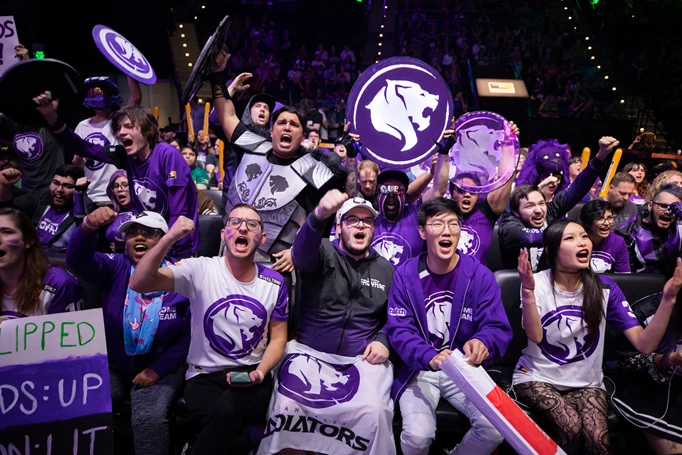
 Click to enlarge
Click to enlargeDiving into the work-life balance for a moment, how have the Gladiators helped the team balance the stresses of COVID-19 and the separation of workspaces and personal spaces?
I think we were fortunate that it did align and was at the top of my priority list when we were looking at the team house. For me, I prioritised finding a house where our guys had their own space because when you’re on the road with your teammates when you come home, everyone is going to want their own personal space. Even if you’re highly extroverted, you’re going to want that separation too. So we had that top of mind when we were thinking about road travel, and it actually works for COVID too.
The way the team house is set up is that everyone has their own room and their own private space and then the living room/recreation room has been turned into our training facility. So I think that made it a little bit better. There are other things we prioritised, like working with Matt to ensure our players had goals for themselves when it came to physical health. Whether it was working against injury prevention or working with any previous injuries they may have had or literally just ‘I want to build up my strength’, we thought that it was a really important road because it would give them something to focus on and it kept them healthy enough for travel. Now we’re looking at it like “okay, now we don’t have hotel gyms, their gym membership has closed down because gyms aren’t able to be open right now.”
So we’ve purchased the equipment to convert the garage into a gym, and I think that’s been really good. We did that to try and maintain some of the small pieces of normalcy, but it ended up benefiting us because it gave the guys a second place to go to. They’ve got the gym, the training room, they have their own personal space, we’re blessed to have a pool and a jacuzzi Overwatch and stuff like that, so they don’t feel like they’re stuck in a box with nothing to do.
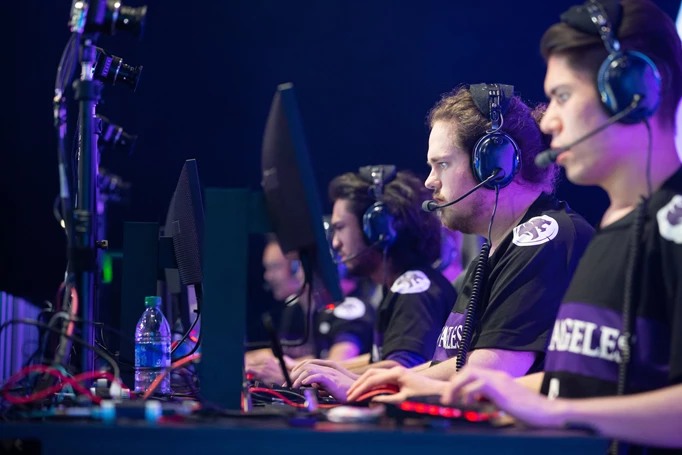
 Click to enlarge
Click to enlargeTransitioning into the 2020 Overwatch League season, could you speak a little bit about the expectations you had or even some of the goals the team had in terms of performance?
I’ll put the asterisk at the beginning that I won’t speak for my coaching staff because if you were to sit down with David or any of our assistant coaches, they are going to have very different goals that they’ve set for the team themselves and I think that’s good, right? You want your competitive staff to put winning as their goal, and they’re taking whatever actions needed to be able to do that. Where I think myself and where the organisation comes in and helps blend that line is that winning is important to us, obviously. At the same time, how we get there and how quickly we get there is where we’re looking at it from the organisational side, and our vision for the team, any team under us, and our organisation as a whole is very long term.
I think we have a very small staff this year and that’s inhibited us in some areas but was very purposefully done because we wanted to make sure our hires were intentional. We didn’t want to transition our season into our [previous] management structure and do exactly what was being done before or to be very rigid in our thoughts force this to work one way. We wanted to make sure we brought in a lean, limited staff so that everyone felt like they had voices so that we could properly develop out our long term vision and working toward that. Where that blends into competitive performance is that for us on the management side, we have very realistic goals. Before we put the roster together, we knew that for Gladiators specifically, we would be happy to have a team that was middle of the pack because we recognised that this year was a rebuilding year.
Realistically, were almost more similar to a new expansion team this year when you think about it. We have David, Faustus was remote coaching last year, and we have BigGoose and Shaze, that’s the only original Gladiators pieces that are still with us - and that’s from top to bottom. Our entire management organisation have changed, we’ve had a lot of additions to our coaching staff, and then our entire roster changed. That, to me, feels very similar to how I felt at the [Guangzhou Charge]. Where you’re a new expansion team figuring it out, you’re not following the same path that was laid down before. So we looked at that, had realistic expectations towards the middle of the pack, then you have signings like OGE and SPACE and some of our other stronger signings, and we’re like “okay, this is a team that can compete.”
That made us more optimistic as an organisation obviously, but at the same time, we don’t want to sacrifice any long term value for short terms gains. We don’t want to tell our coaches like “if you guys don’t make top five, you guys are all fired”. It’s more of let’s take the year to rebuild, let’s figure out the core values of who we are, and we had a real assumption that those might change throughout the season because we’re going to learn a lot and COVID has helped us learn a lot quicker.
In the season, it is really hard to make strong pivots. You can’t say that we’re headed in this direction because it could turn out your wrong, something like COVID could throw a wrench in and forces us to change direction. Even with that being said, if you try to overhaul it you’re just going to capsize but if you make small course corrections, is probably closer to what we’ve done, we’re making progress, but it won’t be until the offseason where we can unpack and evaluate what we’ve done and do the right things so that we really hit the ground running for next season.
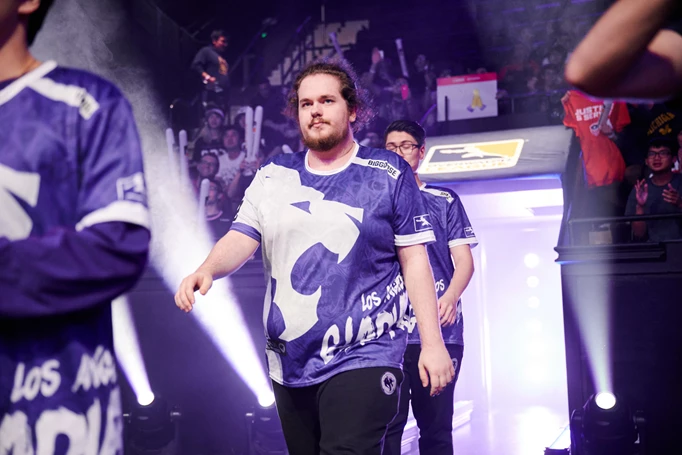
 Click to enlarge
Click to enlargeYou mentioned that this season felt almost like the Gladiators was almost like an expansion team with how much you’ve had to rebuild. Could you talk a bit about some of those specific struggles now that Sentinels has left the picture?
The first thing that comes to mind, and I might get these numbers wrong but, let’s say that the Sentinels was operating the Gladiators with a staff of about 20 people. To put that in perspective we’re operating both the Gladiators in the Overwatch League and the Guerrillas in the Call of Duty League, and aside from our competitive staff, the front office and the back office that supports them is three people across both teams. We’re using contractors to help have extra hands in so that we get the services that we need, but I think that speaks to something that should hinder us, and realistically, it has to. Not having more people is obviously not ideal, but I think that speaks to things we, as a greater organisation, really find important.
We would always rather take things and do it well rather than rush in and get it wrong. So even when it comes to hiring and how we built it out, we could have assumed the right thing to do was to take over the season, hire in twenty people, build the plane as we flew it, and just see how it goes. However, we’ve always prioritised the long term vision and the development of the organisation and these teams a whole. So we wanted to make sure that we actually knew the pieces that we had, like how do those intersect with the greater organisation. As a management team, you always have ideas of how you come in, but now you’ve got managers you don’t know and have never worked with that have different visions.
Instead of clashing with that in the first season, it was more of let’s put everything on the table and talk about it and really take the time to build that out - which is longer than an offseason and you’ll see over the next couple of months, we’re going to have a lot more job postings out we’re feeling really good with the direction we’re headed in. I think that’s something to really point out about this last season, was that something I’ve always said was you have to evaluate people’s strengths and weaknesses before you can build around them because you could be putting up walls or you could be putting up support structures. So I think we’ve gotten closer and closer to getting that right.
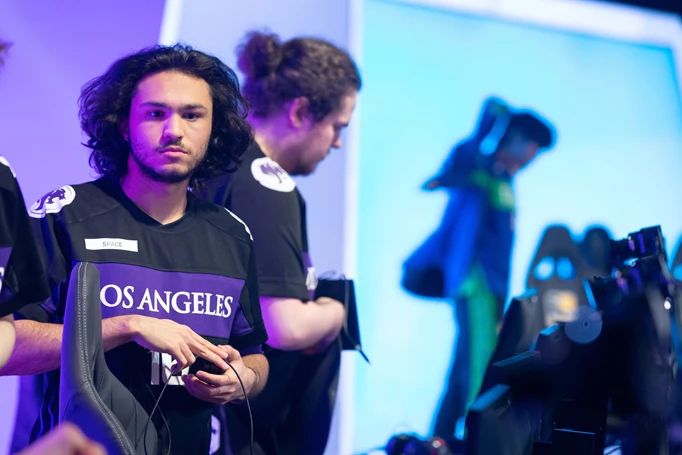
 Click to enlarge
Click to enlargeWith that in mind, the 2020 season has had its ups and downs for the Gladiators. Could you give us a little insight into the temperature of the locker room with regards to the last few week’s results?
The short version is: losing sucks.
It doesn’t feel good, and I don’t want to undervalue that, but something I think we’ve done really well this season with the Gladiators is that we have a really good team culture. I think it takes time to really develop a great culture and I think we could spend a full season talking about the differences between good and great culture and the benchmarkers that we, as a staff, see as indicators. We all have really strong ideas of what that looks like and we have to find the middle ground is between all of us, but I’d say this year, for sure, there isn’t a doubt in my mind that we don’t have a good culture. We have coaches and players who take the loses hard, as you’d expect someone whose a professional player or coach to take them, but they take them hard, and they come back in stride. It’s been extremely hard too, like I said, as an organisation we prioritise safety, and in hindsight, I think we hindered our coaches abilities.
Not allowing them back on-site, we all agreed it was the right choice, it’s not like anyone felt differently about it or would go back and change it because safety should have come first, but at the same time, the impact of not having our coaches at the house was really felt. It’s been two weeks now of them being back at the house, for matches only and it feels a lot better. Like I mentioned earlier, we have strong leadership, so just the difference of us having them there versus not? Think about something like a halftime speech and the difference of doing that over Team Speak versus doing that in person with the team? I think that has helped tremendously over the last two weeks too.
The coaching staff probably all have their own different opinions on this, but could you give us a general feeling of the team’s goals and expectations as they head into the Countdown Cup?
I think the coaches would kill me if I said anything that wasn’t “our goal for Countdown Cup is to win.” If it takes anything more than that sentence, I think that my coaching staff would be super mad at me.
With that being said, we want a strong showing at Countdown Cup because we know what this roster is capable of. I think there has been a lot of thoughts and opinions on the Gladiators more and more - and we hear that, and we’re aware, but you’ve just got to trust the process. I strongly believe that.
I strongly believe in who David is as a coach, the player who we have on this team, we’re still finding exactly what our style is in my opinion, but part of that is all momentum within the season. Coming off some tough losses and leading into Countdown Cup, we had some tough opponents, and we knew that they were tough. We want to do well here so that we can build that momentum and have a really strong showing in playoffs.
Images via Blizzard Entertainment
